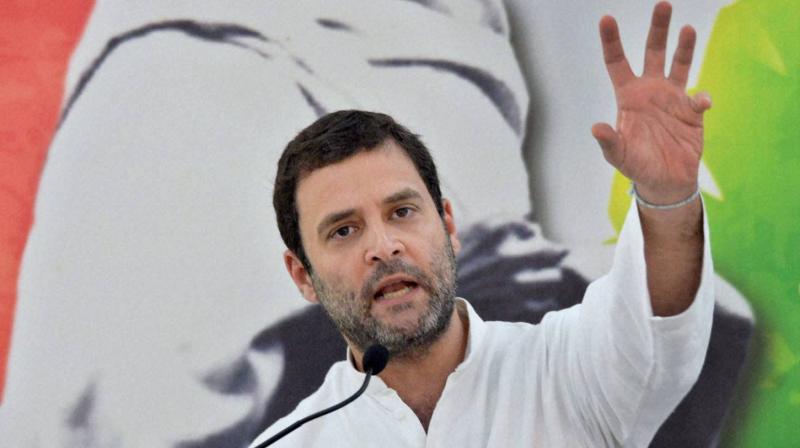Wide Angle: How will Rahul deal with Kejri, Mamata?

It would be shortsighted to allow the fifth anniversary of the Aam Aadmi Party to be drowned out by other, more bleak anniversaries. Something new had happened in the Indian political space, a newness which was also causing convulsions in liberal democracies elsewhere. I shall briefly touch on some of them to bring out the different ways in which establishments sought to thwart or absorb the people’s anger.
The Insignificant Man, a remarkable film, conjures up all the images of the AAP’s shock debut in December 2013 and its stunning consolidation in February 2015, winning 67 of the 70 seats in the Delhi Assembly. I receive calls from friends in Mumbai — who should they contact in Delhi with sizeable donations? Wives of retired officials, copy editors are all volunteering to work for AAP. Doctors, nurses, technicians at Max Hospital are wearing AAP badges — enthusiasm on an unimaginable scale. Just think of those heady days. The response to the AAP’s meteoric rise and the current conventional wisdom have their contexts.
The way globalisation manifested itself in India may have boosted business but it stifled discourse. The four Cs — Cricket, Cinema, Crime and Communalism — pushed out most serious debate from the mainstream. Murdochisation spread across the media (globally too), controlled by industrialists and corporates, pillars of globalisation as well as crony capitalism. It was an unseemly two-legged race. In this atmosphere, pouring venom on the AAP soon after its rise became only a shade less popular on the ratings chart than badgering Pakistan. The AAP was neither Left nor Right. It was frontally against the establishment and the establishment was going to tattoo it with double-fisted punches.
Well-informed, gregarious though moderately paid journalists were gradually replaced by star anchors with stellar salaries, mandated to ginger up content to support advertising, the vehicle for a burgeoning economy. Studios became arenas not for debate and discussion but for a cruel sport resembling a cockfight. But when the Lehman Brothers crashed in 2008, signalling capitalism’s state of disrepair, the Indian economy too was checked in its tracks. But advertising agencies with long contracts continued to support the cockfight format. It was inexpensive.
Crony capitalism tied to a system which had become increasingly unsure of itself, led to widespread suffocation across the globe. Voters began to dream dreams of breaking out of the straitjackets of available political parties. The AAP, as I said earlier, was not the only eruption. There were many assaults on the establishment, from the Left as well as the Right, everywhere.
Systems churned, bringing out the establishment’s willingness to make adjustments, but only with the Right. The Left was negotiated differently.
Take the 2016 American presidential elections. The Republicans had settled for Jeb Bush in a tepid sort of a way but the establishment’s overwhelming consensus was for Hillary Clinton. That which made her the establishment’s favourite was exactly the reason why she was unelectable — she was THE establishment, an entity utterly in bad odour with an exponentially increasing number of people.
Bernie Sanders, a frontrunner by yards in the Democratic primaries and who, in retrospect, would have won the election, was halted in his tracks. A gamble with Donald Trump as a possibility was considered preferable on both sides of the aisle to a “Caamunist” like Sanders.
McCarthyism was very much alive. Let’s consider an example elsewhere — Spain.
When Pablo Iglesias, leader of Podemos, a Communist formation, burst on the political scene with a substantial number of seats, the establishment was rattled. Prime Minister Mariano Rajoy of the right-wing Peoples’ Party, primarily responsible for the unspeakable corruption which loomed heavy over the election, had been reduced to a minority. He would have been defeated in the event of a vote in the House. But crafty systems managers kept a defeated Prime Minister in power until the next election in June 2016. (Miraculously, Mr Rajoy is still Prime Minister, but on that more later.)
In the meantime a centre-right party, mimicking Podemos’ aesthetics, named Ciudadanos (Citizen) was hurriedly promoted. It made noticeable gains. The establishment had seen the writing on the wall. Manipulations could sustain the status quo but not beyond a point, given the growing resentment against establishments. In the meantime alternatives will have to be put in place — Ciudadanos, for instance — to protect Spain in the future from a Podemos-like “disaster”. It was the Ciudadanos model that Emmanuel Macron followed in France — respond to a quest for apparent novelty and do the establishment’s bidding.
A rash of far-right, anti-immigrant, Islamophobic parties in Europe are causing a lot of anxiety to establishments. But imagine Communists like Pablo Iglesias in Spain or Jean-Luc Melenchon in France or even a mild Leftist like Bernie Sanders in the US: were these to be found anywhere in the vicinity of power and there would be upheaval on an epic scale. On the other hand, 31-year-old Sebastian Kurz, a far-right neo-Nazi, becomes the Chancellor of Austria, and the murmurs, always faint, are already muted.
Keep the global background in mind but consider the AAP in an Indian setting, because details are inevitably different from the West.
Remember how the Congress, the BJP, corporates, the media, the lieutenant-governor, the administration, the police and enforcement agencies all pounced on the AAP, almost in concert? The young party was mauled, gored, not allowed to function. And soon, the media’s high-decibel 24/7 anti-AAP chant did begin to affect the middle classes, the chatterati and the would-be AAP volunteers of 2014 — they began to troop out. But, in my experience, neighbourhood drivers and workers have not wavered, some of them are quite content with what the AAP claims as its achievements — water, power, education and neighbourhood clinics.
“Any party, even at municipal level, which has done as much — let it raise its hand,” says one of them. Well, I say, let’s wait till 2019. This lot obviously has its ears close to a group. They tossed at me the AAP’s performance in Punjab. “They may not be in power but they are the principal Opposition in the state.”
The Congress’ incoming president, Rahul Gandhi, was once admiring of the AAP’s rapid rise. He now has to decide what stance to strike — fight the AAP to reclaim Delhi or incorporate it within the bigger battle in 2019. On this decision will depend another — how will he handle Mamata Banerjee in West Bengal?

